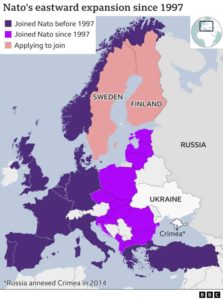
the president of russia, Putin stated that, always made it quite clear that the main reason for the invasion of Ukraine was the threat that the country's possible NATO membership posed to Russia's security.
The strong objection must not be, only, the fact that Ukraine is a country closely linked to Russia, with common historical roots, that would be moving away from the orbit of Russian influence towards the Western Alliance and the European Union. But, mainly, always according to President Putin's line of reasoning, it would be another step in NATO's continued expansion towards Russian borders.. After all, former former soviet republics, Latvia, Estonia and Lithuania, in addition to former Warsaw Pact allies, Poland, Bulgaria, Romania, Hungary, Czech Republic and Slovakia, are already part of NATO. Seeing Ukraine join this group is not acceptable for Russian President.

Source – BBC
In this way, understands the annoyance that President Putin is certainly experiencing when he sees that Sweden and Finland, historically neutral countries, express their firm intention to join NATO.
Sweden has not been part of any military alliance for over 200 years, since the napoleonic wars, and also maintained neutrality during World War II. Finland, on the other hand, became neutral after losing about 10% from their territories to the then Soviet Union, in WWII.
The change in posture of the two Nordic countries is surprising and reflects the major changes in Europe's security environment after the Russian invasion of Ukraine., in 24 of February. The perception of the threat became palpable and the war for the conquest of territory, an unthinkable possibility until recently, even more in Europe, it shows itself real. And that sense of insecurity was reflected in Finnish and Swedish public opinion.. Opinion polls taken in February indicated that only 53% of Finns were in favor of joining NATO. Today, the indexes changed a lot, informing that 76% of the population became in favor of joining
Entry into NATO depends on a rite that, if it depends on the statements of the Secretary General of the organization, Jens Stoltemberg, a norwegian, will be accelerated to the maximum. However, there may be some difficulties. According to the organization's rules, the acceptance of a new member depends on the unanimous agreement of all its members.
the president of turkey, Recep Erdogan, hinted that his country would be against entry by declaring that“We are following the development of the situation with Finland and Sweden, but we are not sure [about this subject]. Nordic countries are a hostel for terrorist organizations”. Erdogan is referring to Turkish nationals who the regime considers linked to Kurdish terrorist activities who are welcomed as refugees in both Nordic countries.. The Turkish president even referred to Greece, stating that it was a mistake for NATO to accept that country as a member, in the past.
Despite these demonstrations by the Turkish president, Turkey is unlikely, when formally called upon to speak out within NATO, actually vetoes the entry of Swedes and Finns. It would be politically very difficult to sustain such a position in the Alliance, putting itself in an antagonistic position to practically all partners precisely in a moment of crisis. Finland formally integrated into NATO will add 1.340 km of direct border between Russia and the allies, practically doubling the current extent, which is from 1.215 Km. In turn, Swedes in NATO represent a major increase in Alliance security and deterrence in the Baltic Sea, a region of capital importance to Russian strategic interests.
Almost three months after the start of the invasion of Ukraine, Russians suffer a severe political-strategic setback. The strengthening of NATO as a result of Russian military action constitutes an outcome absolutely contrary to Putin's objectives.. It remains to be seen what Russian responses to these events will be..
